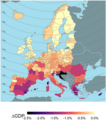2003 European heat wave facts for kids
The 2003 European heat wave was a huge natural event that brought extremely hot weather to Europe during the summer of 2003. It was the hottest summer recorded in Europe since at least the year 1540. This heat wave caused serious problems for people's health in many countries. It also made droughts worse, which meant that crops in Southern Europe did not grow well.
More than 70,000 people across Europe sadly died because of the extreme heat. In France, nearly 19,000 people died, according to a study by Inserm. Other countries like the Netherlands, Portugal, and Spain also saw many deaths.
Contents
What Was the 2003 European Heat Wave?
A heat wave is a period of unusually hot weather that lasts for several days or weeks. The 2003 heat wave was special because it was so intense and covered such a large area of Europe. It was one of the most severe natural disasters in recent European history.
How Hot Was It?
During the summer of 2003, temperatures across Europe soared to record-breaking levels. Many places experienced their hottest days ever recorded. This extreme heat lasted for a long time, making it very difficult for people and the environment to cope. The heat was much higher than what people were used to, even in summer.
What Happened to People?
The very high temperatures were dangerous for many people, especially the elderly and those with existing health problems. When it's too hot, your body can struggle to cool itself down. This can lead to serious conditions like heatstroke and dehydration. Hospitals became very busy trying to help everyone who was sick from the heat. Countries like France were hit particularly hard by these health crises.
What Happened to Nature?
The heat wave also had a big impact on the environment. The hot weather made existing droughts much worse. A drought is when there is not enough rain for a long time. Rivers and reservoirs, which hold water, became very low. This meant less water for drinking, farming, and for animals. The lack of water and extreme heat also damaged crops, leading to less food being harvested in some areas.
What Can We Learn?
The 2003 heat wave taught us important lessons about preparing for extreme weather. It showed how important it is to stay hydrated by drinking plenty of water when it's hot. Finding ways to stay cool, like staying indoors or using fans, is also very important. Checking on older family members and neighbors during heat waves can help keep everyone safe. Scientists also study events like this to understand how climate change might affect future weather.
Images for kids
See also
 In Spanish: Ola de calor en Europa de 2003 para niños
In Spanish: Ola de calor en Europa de 2003 para niños
 | Jessica Watkins |
 | Robert Henry Lawrence Jr. |
 | Mae Jemison |
 | Sian Proctor |
 | Guion Bluford |




